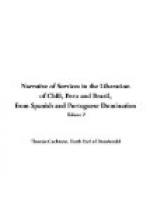A variety of fetes was given at Valparaiso in honour of our arrival, these being prolonged for so many days as to amount to a waste of time. The same scenes were, however, re-enacted at the distant capital, whither the Supreme Director insisted on taking us, till I had to remind His Excellency that our purpose was rather fighting than feasting. Nevertheless, the reception we had met impressed me with so high a sense of Chilian hospitality, that, heartbroken as I had been by the infamous persecution which had driven me from the British navy, I decided upon Chili as my future home; this decision, however, being only an exemplification of the proverb "L’homme propose—Dieu dispose."
The Chilian squadron had just returned from a successful cruise, the gallant Admiral Blanco Encalada, who commanded it, having captured a noble Spanish 50-gun frigate, the Maria Isabel, in the bay of Talcahuano.
The squadron consisted of the recently captured Spanish frigate, now named the O’Higgins, in honour of the Supreme Director; the San Martin, 56 guns, formerly the Cumberland Indiaman, which had been bought into the service; the Lautaro, 44 guns, also a purchased Indiaman; the Galvarino, 18 guns, recently the British sloop of war Hecate; the Chacabuco, 20 guns; and the Aracauno, 16 guns; a force which, though deficient in organization and equipment, was very creditable to the energy of a newly emancipated people.
A few days after my arrival a commission was issued, conferring upon me the title of “Vice-Admiral of Chili, Admiral and Commander in Chief of the Naval Forces of the Republic.” Admiral Blanco, with patriotic liberality, relinquishing his position in my favour, though, from his recent achievement, justly entitled to retain it; paying me also the additional compliment of personally announcing to the ships’ companies the change which had been effected.
My advent was regarded by the captains of the squadron with great jealousy, the more so, as I had brought with me from England officers upon whom I could place implicit reliance. It so happened that two of the Chilian commanders, Captains Guise and Spry, had shortly before arrived from England with the Hecate, which had been sold out of the British navy, and bought by them on speculation. The Buenos Ayrean Government having declined to purchase her, they had brought her on to Chili, where the Government took her and received her former owners into its service. These officers, together with Captain Worcester, a North American, got up a cabal, the object of which was to bring about a divided command between myself and Admiral Blanco, or, as they expressed it—“two commodores and no Cochrane.” Finding that Admiral Blanco would not listen to this, they persuaded one or two of the inferior ministers—whose jealousy it was not difficult to excite—that it was dangerous and discreditable to a republican




